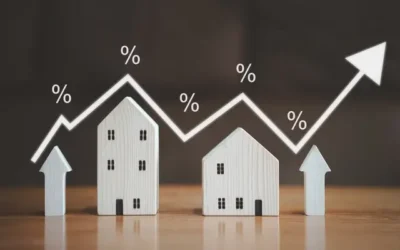Inflation continues to shape the 2024 housing market, influencing everything from home prices to mortgage rates and buyer demand. As inflation rates impact purchasing power and affect loan affordability, understanding these effects is critical for prospective buyers and investors.
In this article, we’ll break down how inflation rates are affecting home prices, the cost of borrowing, and demand in the housing market. With expert insights and current data, we’ll help you navigate this evolving landscape.
The Relationship Between Inflation and the Housing Market
When inflation rises, it leads to a general increase in prices across sectors, including housing. This affects:
- Mortgage rates – Higher inflation often leads to rising interest rates.
- Buyer purchasing power – With rising costs, buyers may struggle to afford high-priced homes.
- Housing demand – As homes become less affordable, demand fluctuates.
To understand the extent of these impacts in 2024, we’ll look at each factor in more detail.
Rising Home Prices in 2024
As of October 2024, the national median home price has increased by 3.2% year-over-year, with the current average sitting at $416,000. This increase aligns with overall inflation trends, as builders and sellers adjust prices to keep pace with rising construction and material costs.
Median Home Prices by Region (2024)
| Region | Median Price (2024) | Year-Over-Year Change |
|---|---|---|
| Northeast | $420,000 | +4.0% |
| Midwest | $330,000 | +2.8% |
| South | $375,000 | +3.5% |
| West | $490,000 | +2.9% |
“Inflation continues to drive up home prices, particularly in high-demand areas,” explains Sarah Lindon, a Housing Analyst at Horizon Realty Partners. “Buyers are paying more, not just because of limited inventory, but due to higher costs in labor and materials.”
Impact of Inflation on Mortgage Rates
Rising inflation has prompted the Federal Reserve to adjust interest rates to slow inflation growth, directly impacting mortgage rates. The average 30-year fixed mortgage rate currently stands at 6.75%, a significant increase from the lows of 2020 and 2021.
“Mortgage rates reflect the Fed’s inflation-fighting measures,” says Michael Hughes, Chief Economist at LendSure Financial. “As inflation rates remain high, we’re likely to see mortgage rates continue at elevated levels, impacting both affordability and buyer sentiment.”
Mortgage Rate Changes Over Time
| Date | 30-Year Fixed Rate | Change Since 2023 |
|---|---|---|
| December 2023 | 6.00% | +0.75% |
| March 2024 | 6.50% | +0.50% |
| July 2024 | 6.65% | +0.15% |
| October 2024 | 6.75% | +0.10% |
How High Mortgage Rates Affect Buyer Decisions
Higher mortgage rates increase monthly mortgage payments, making homeownership less attainable for many buyers. This trend particularly affects first-time homebuyers, who may find it challenging to save for down payments in the face of rising rent and other costs.
Buyer Demand and Market Activity in 2024
With inflation driving up mortgage rates and home prices, buyer demand has seen fluctuations. Some buyers are holding off, waiting for a possible decrease in mortgage rates or an increase in available inventory.
Key factors influencing buyer demand include:
- Affordability challenges – High mortgage rates and home prices are pushing some buyers out of the market.
- Increased rental demand – Many would-be buyers are opting to rent until affordability improves.
- Investors rethinking options – High rates are making investment properties less profitable, leading some investors to pause.
Regional Differences in Buyer Demand
Buyer demand varies across regions, with some states seeing steeper declines than others. States with higher costs of living, such as California and New York, have seen larger drops in buyer demand, while areas with lower price points have managed to maintain moderate interest.
Inflation’s Impact on Real Estate Investment
Real estate investors, who typically look for high returns through rental income or property appreciation, are facing new challenges in 2024. Higher rates are cutting into profit margins, leading some investors to shift their strategies or look into alternative asset classes.
According to Dennis Wright, Head of Investment Strategy at Maple Capital, “The high interest rates we’re seeing make cash flow from rental properties less attractive, especially in markets where property taxes and insurance costs have also risen due to inflation. Many investors are taking a more cautious approach.”
Key Points for Investors:
- Higher rates may limit profit margins on rental properties.
- Some investors are holding off on new purchases until rates decrease.
- Property values may still appreciate over time, creating a long-term opportunity for investors with the right risk tolerance.
How Prospective Buyers Can Navigate the 2024 Market
For Veterans and other prospective buyers, navigating the housing market amid inflation can be challenging. To mitigate the impacts of high mortgage rates and prices, consider these strategies:
- Explore VA Loans – VA loans offer favorable terms, including no down payment and no PMI requirements, providing Veterans with a competitive advantage in a high-cost market.
- Improve Credit Scores – A higher credit score can help secure better mortgage rates.
- Consider Smaller Markets – High-demand urban areas are more affected by price increases. Smaller towns or suburban areas may offer more affordable options.
- Work with Experienced Real Estate Agents – Agents familiar with local markets can help identify opportunities and negotiate favorable terms.
Current Housing Market Trends to Watch
As we approach the end of 2024, several trends continue to shape the housing market, particularly under the influence of inflation:
- Slight price stabilization – While prices have risen, the pace has slowed compared to the rapid growth of previous years.
- Growing rental market – The inability of many buyers to enter the housing market is driving rental demand.
- Market uncertainty – As inflation remains high, some buyers and sellers are taking a cautious approach.
The Bottom Line
How does inflation impact mortgage rates?
Inflation increases borrowing costs as the Federal Reserve adjusts interest rates to control inflation. This results in higher mortgage rates.
Are home prices likely to decrease soon?
It’s uncertain. While high inflation may stabilize prices, factors like inventory shortages and ongoing demand could keep prices elevated.
How does a VA loan help Veterans in a high-inflation market?
VA loans provide favorable terms, such as no down payment, which can make homeownership more attainable despite rising costs.
Will housing demand continue to drop?
If inflation and mortgage rates remain high, buyer demand may continue to soften, especially among first-time buyers.
Are there regional differences in inflation’s impact on housing?
Yes, states with higher costs of living are experiencing larger affordability issues, whereas lower-cost areas are maintaining more stable demand.
What are some strategies for buyers facing high mortgage rates?
Improving credit scores, choosing less competitive markets, and exploring loan options like VA loans can help mitigate high rates.
Is it a good time to invest in real estate?
High rates may affect profit margins, but long-term investors could still see value if property values appreciate over time.
Will mortgage rates decrease if inflation slows?
A decrease in inflation could prompt the Federal Reserve to lower interest rates, which may lead to a reduction in mortgage rates.

The VA Loan Network Editorial Team is comprised of dedicated mortgage specialists and financial writers committed to providing veterans and service members with accurate, up-to-date information on VA loan benefits, eligibility, and the home-buying process.








